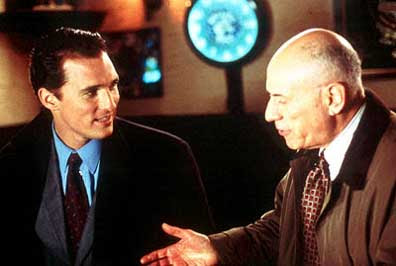Thirteen Conversations About One Thing: DVD & Movie Review

(Originally published 2001)
Jill Sprecher's "Thirteen Conversations About One Thing" is a terrific film based in part on Sprecher’s own experiences in the early 1990s, when she was mugged in New York City and left for dead.
Sprecher survived the attack, but not without developing a new perspective on the world that some will find uncomfortably dark—and others, refreshingly honest.
Her last film, 1997’s "Clockwatchers," a biting commentary on the gross mistreatment of four temporary office workers, seemed to indicate that she might join director Todd Solondz in pursuing a career that presented bleak, yet occasionally comic views of a world in which happiness is a luxury bestowed upon only a random few.
But "Thirteen Conversations About One Thing" finds the director cultivating a deeper cynicism and embracing it, suggesting most people never find true happiness and, worse, for those who do, they’ll almost always have it stolen away.
The film, which Sprecher co-wrote with her sister Karen, follows several interrelated New York stories and the people barely existing within them.
There’s Gene (Alan Arkin), an insurance claim adjuster so miserable with his botched life, he seeks to ruin a perpetually cheerful co-worker named Dick (Frankie Faison), a middle-aged man who seems to have lived a charmed life.
There’s Troy (Matthew McConaughey), a successful lawyer whose life looks golden until the night he climbs into his car and accidentally mows down Beatrice (Clea DuVall), a sweet-hearted maid whose soul hardens after she’s left broken and bleeding in the street, a direct parallel to Sprecher’s own life. Consumed by guilt, Troy gradually falls apart.
There’s Walker (John Turturro), a physics professor at Columbia University who claims he’s never felt happier or more alive since he began cheating on his wife (Amy Irving), a woman whose devastation at the loss of her marriage is only matched by Walker’s own devastation when he’s faced with the potential loss of his mistress (Barbara Sukowa).
As the film unwinds, reeling back and forward in time for dramatic effect, the characters launch into 13 telling, often heated conversations that reveal all that’s right and wrong with the world through Sprecher’s knowing gaze.
In one scene, a character notes how strange it is to live in a city where everyone goes out of their way not to look at each other. "Human beings need 18 inches of space," he states. In another scene, Turturro’s professor challenges a failing student on why he wants to become a doctor. "So you can prolong their misery into tomorrow?" he asks cruelly, unaware that the ramifications of that statement will prove haunting.
Unlike Solondz’s 1998 film, "Happiness," which he once described to me as "a comedy of this horror show that we live in," "Conversations" has no room for black humor and no time for a light moment. That’s not to say that it’s without hope—hope underscores everything here--but there’s no denying that it’s one of the grimmest films of the year.
With its superb performances and provocative script, it’s also one of the year’s best and bravest, a film that finds Sprecher using her characters to explore her own questions about the state of the world and her concerns for the human condition.
Grade: A


































0 comments:
Post a Comment